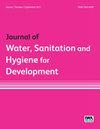COVID-19, public health messaging, and sanitation and hygiene practices in rural India
IF 1.4
4区 环境科学与生态学
Q3 WATER RESOURCES
Journal of Water Sanitation and Hygiene for Development
Pub Date : 2022-10-21
DOI:10.2166/washdev.2022.134
引用次数: 0
Abstract
Despite the importance of safe sanitation and hygiene for sustainable development and public health, approximately half of India's rural population lacks access to safely managed sanitation. Policies prioritizing improved sanitation access have accelerated coverage, yet barriers to universal access and use remain. In this paper, we investigate how personal experience with a public health shock impacts recall of public health messages and households' sanitation and hygiene practices. Using a panel survey conducted before and after the first wave of the COVID-19 pandemic, and the resulting lockdown, in Bihar, India, we compare public health messaging recall and hygiene and sanitation behaviors among households that experienced severe economic disruptions due to the COVID-19 lockdown and those that did not. We find that households that experienced economic disruptions had a higher recall of public health messaging around safe sanitation and hygiene. In addition, households that experienced these disruptions reported more social distancing, increased handwashing behavior, and reduced open defecation. A major public health shock, the COVID-19 pandemic, increased messaging around the importance of safe hygiene and sanitation for public health in India. We find that personal experience increased the salience of public health messaging, with positive returns to sanitation and hygiene practices.2019冠状病毒病、公共卫生信息以及印度农村的环境卫生和个人卫生习惯
尽管安全的环境卫生和个人卫生对可持续发展和公共健康至关重要,但印度大约一半的农村人口无法获得安全管理的环境卫生。优先考虑改善卫生设施的政策加快了覆盖速度,但普遍获得和使用卫生设施的障碍仍然存在。在本文中,我们调查了个人经历与公共卫生冲击如何影响公共卫生信息和家庭卫生和卫生习惯的回忆。通过在印度比哈尔邦第一波COVID-19大流行以及由此导致的封锁前后进行的小组调查,我们比较了因COVID-19封锁而遭受严重经济破坏的家庭和未遭受严重经济破坏的家庭的公共卫生信息召回和卫生和环境卫生行为。我们发现,经历过经济中断的家庭对安全卫生和个人卫生方面的公共卫生信息的回忆更高。此外,遭受这些干扰的家庭报告说,他们增加了社交距离,增加了洗手行为,减少了露天排便。2019冠状病毒病大流行是一场重大的公共卫生冲击,在印度,人们进一步认识到安全卫生和环境卫生对公共卫生的重要性。我们发现,个人经验提高了公共卫生信息的重要性,对环境卫生和个人卫生习惯产生了积极的影响。
本文章由计算机程序翻译,如有差异,请以英文原文为准。
求助全文
约1分钟内获得全文
求助全文
来源期刊

Journal of Water Sanitation and Hygiene for Development
WATER RESOURCES-
CiteScore
3.10
自引率
11.80%
发文量
58
审稿时长
16 weeks
期刊介绍:
The Journal of Water, Sanitation and Hygiene for Development is a peer-reviewed journal devoted to the dissemination of high-quality information on the science, policy and practice of drinking-water supply, sanitation and hygiene at local, national and international levels.
 求助内容:
求助内容: 应助结果提醒方式:
应助结果提醒方式:


